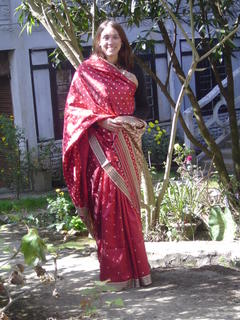 For those of you who have been waiting for me to finally post thoughts and pictures from India and Zambia, the time has finally arrived. The past year has been a time of HUGE growth and many many new experiences. And I have loved it. My passion for the marginalized and for those living in poverty has deepened and my life has been touched by many incredible people. I will definitely never be the same.
For those of you who have been waiting for me to finally post thoughts and pictures from India and Zambia, the time has finally arrived. The past year has been a time of HUGE growth and many many new experiences. And I have loved it. My passion for the marginalized and for those living in poverty has deepened and my life has been touched by many incredible people. I will definitely never be the same.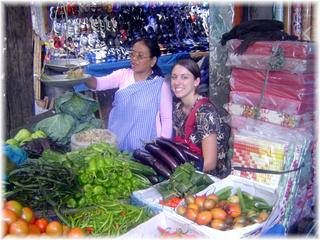
In India, I had the priviledge of working with SOFMEDA -- the Society of Micro-Economic Development Activities. I loved my time there. Apona, Baia, Mr. Amzad, Atola, Shalome, Alemla, Druba -- these are just a few of the many friends who I still hold in my heart.
SoFMEDA works with women and marginalized tribes in NE India to empower them to create a sustainable future for their families. Many of SoFMEDA's clients have small businesses such as a vegetable stand or the retail of craft items.
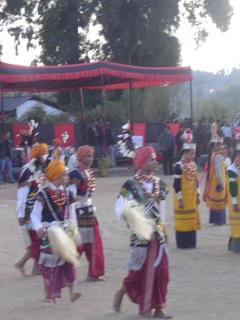
The region I was in in NE India is very diverse. I was in a state called Meghalaya -- which is majority Christian. There is also a strong Hindu precence and many traditional tribal religions -- although these are not as strong anymore. Hundreds of different
 tribal groups make up this region -- so there were so many different cultures and languages all around. I had it easy -- the official language is English so there was not a language difficulty except when I went into rural areas. Each staff person of SOFMEDA speaks different languages -- so they are able to represent many different clients who are part of the program. SOFMEDA works in about 6 of the states in the NE part of India.
tribal groups make up this region -- so there were so many different cultures and languages all around. I had it easy -- the official language is English so there was not a language difficulty except when I went into rural areas. Each staff person of SOFMEDA speaks different languages -- so they are able to represent many different clients who are part of the program. SOFMEDA works in about 6 of the states in the NE part of India.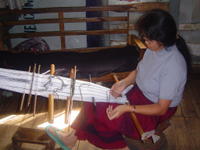 I lived with a woman named Atola. She is one of the greatest persons I have ever met -- and one of the most
I lived with a woman named Atola. She is one of the greatest persons I have ever met -- and one of the most encouraging and inspirational as well. Atola is the Vice-President of the Asian Baptist Women's Federation and was recently in the UK for the World Baptist Alliance Conference where she was asked to speak! She runs a Christian girls' hostel in Shillong that I was priviledged to get the chance to speak at.
encouraging and inspirational as well. Atola is the Vice-President of the Asian Baptist Women's Federation and was recently in the UK for the World Baptist Alliance Conference where she was asked to speak! She runs a Christian girls' hostel in Shillong that I was priviledged to get the chance to speak at.The girls were so sweet -- and really loved hearing about America and my passions and convictions that brought me to Shillong. Atola became like a mom to me -- and we still keep in contact by email. There is a large part of my heart that is going to be stuck in Shillong forever!!
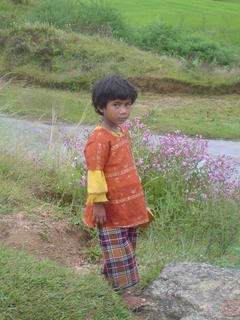 gatherings/hostels while in India. I was able to share my faith and how I have chosen to put that Faith into Action. There was a Christian boys hostel on the compound where I lived with Atola, and I had the chance to speak with them a few times. It was encourageing to see the next generation of guys who have a passion for Christ and outreach. And let me tell you -- the youth movement in NE India is incredible. I felt like I was back in college again -- with all the different fellowships with INCREDIBLE worship.
gatherings/hostels while in India. I was able to share my faith and how I have chosen to put that Faith into Action. There was a Christian boys hostel on the compound where I lived with Atola, and I had the chance to speak with them a few times. It was encourageing to see the next generation of guys who have a passion for Christ and outreach. And let me tell you -- the youth movement in NE India is incredible. I felt like I was back in college again -- with all the different fellowships with INCREDIBLE worship. 
I also taught Sunday School for college girls for a few weeks at one church in Shillong. Then I began teaching in a neighborhood outreach program in the community I lived in. Most of the children were Hindu and came from very poor families. They would gather in a community hostel for a couple hours on Sunday mornings where we sang songs and told Bible Stories. The children were so precious -- another highlight of my time there.
At the end of my 4 months in Shillong, I got to do a bit of sightseeing before flying home in time for Christmas. I spent 4 days in
 Delhi. I was pretty sick at the time, but I did manage to get out of bed to take a day-trip to Agra to see the Taj Majal. I also saw TONS of monkeys -- which was a highlight for me. Of course, when I went into a "rest stop" bathroom with no electricity -- this sign that informed me to "beware of wild monkeys" slightly unnerved me as I fumbled through the dark praying that no wild monkeys would be in my toilet stall!!
Delhi. I was pretty sick at the time, but I did manage to get out of bed to take a day-trip to Agra to see the Taj Majal. I also saw TONS of monkeys -- which was a highlight for me. Of course, when I went into a "rest stop" bathroom with no electricity -- this sign that informed me to "beware of wild monkeys" slightly unnerved me as I fumbled through the dark praying that no wild monkeys would be in my toilet stall!!
At the end of my time in Shillong, I sent home my last update where I shared some of the highlights and experiences I had in India -- also some things that stuck out about my living there! Some are things I love (and hate) and others are just events that struck me as being special. I thought I'd post it for you to see. Here it is from Dec. 2004:

- I am so sick of rice!! I've eaten it several times a day for the pastmonths, and I think if I never eat it again I will be just fine!
- I LOVE masala chai (it's just tea with milk--but mixed with the tea leaves are lots of spices: cinnamon, bay leaf, ginger). My host, Attola, makes the very best tea I've ever had. And this is coming from someone who has HATED tea her whole life!
- I will really miss the children here: they are so precious. Even the poorest children, who can't even afford new clothing or to go to school have a glow around them. They are just like all the little children in the US---they love to play, sing, and run around. And they don't even realize that they lack so many of what we consider the basic necessities.
- Teenagers here are just like teenagers in the US---they like the same music, movies, and they even dress the same! When I spoke at several hostels---the girls always wanted to know this: 1) Have I ever met any celebrities? 2) Do I have a boyfriend? 3) When I want to get married! - I think all teenage girls in the world want to know about boys and movie stars!
- So many people here are struggling to just provide enough food to feed t
 heir families---and it's not because of laziness or bad choices---they have full time jobs that pay them nothing, and they have lived in poverty their whole lives---it's almost impossible to break free from this cycle.
heir families---and it's not because of laziness or bad choices---they have full time jobs that pay them nothing, and they have lived in poverty their whole lives---it's almost impossible to break free from this cycle. - There are SO many loving, compassionate, innovative people here who have brilliant programs and ideas to target poverty---but they just don't have the funds to implement the ideas. I think about how easy it would be to raise the funds in the US.
- I have a new favorite food that I will have to find somewhere in the US when I get home: Naan and Chicken Kurma. YUMMM. I get it for lunch a couple times a week! I've also eaten some really weird and gross stuff: cow spleen and eel are two of them. And I think we've established that fermented bamboo shoot does NOT agree with my tummy!
- To my surprise and delight, my host prepared a big Thanksgiving dinner for me and all the neighbors (of course, there was no turkey or pumpkin pie) but it was so nice!
 I went to the PETRA concert that was held in Shillong last month. For those of you who don't know Petra-- they're a Christian rock group that has been around since the 70's--and they're still winning Grammy and Dove awards! Shillong has NEVER had such a huge concert as this-- and you would have thought they were hosting the Olympics for the hoopla the whole region made! It was an official event-- even the Governor spoke, and there were about 20,000 people at the concert! It was so fun for mebecause Petra was the first concert I ever went to when I was young. Then to make it even more random: I ended up meeting the band and the other people traveling with them (my white face stuck out in the crowd)--and then showed them around Shillong for the next few days. It was so nice to have some Americans to hang out with after three months without seeing any!!
I went to the PETRA concert that was held in Shillong last month. For those of you who don't know Petra-- they're a Christian rock group that has been around since the 70's--and they're still winning Grammy and Dove awards! Shillong has NEVER had such a huge concert as this-- and you would have thought they were hosting the Olympics for the hoopla the whole region made! It was an official event-- even the Governor spoke, and there were about 20,000 people at the concert! It was so fun for mebecause Petra was the first concert I ever went to when I was young. Then to make it even more random: I ended up meeting the band and the other people traveling with them (my white face stuck out in the crowd)--and then showed them around Shillong for the next few days. It was so nice to have some Americans to hang out with after three months without seeing any!!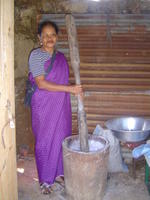 People here are so generous: My suitcase is completely full of gifts from people I've met. Gifts of traditional shawls from different tribal groups and the traditional skirts the women wear are taking up most of the room! But they are gifts I'll always treasure. I just have to remember the story behind each one!
People here are so generous: My suitcase is completely full of gifts from people I've met. Gifts of traditional shawls from different tribal groups and the traditional skirts the women wear are taking up most of the room! But they are gifts I'll always treasure. I just have to remember the story behind each one!- One thing I will NOT miss: the windy, bumpy roads. I don't think anyone could not get sick riding on these roads!! I also am looking forward to taking nice hot showers -- having no running water has been fun -- but I can't wait to shower without just pooring buckets over my head!!
- Being one of the only Americans in Shillong, I'm always the "special guest" everywhere I go, and people want me to speak at different functions. It's been great to have such a warm welcome to share about my life and why I'm here. I don't even have to look for opportunities to share-they always invite me!
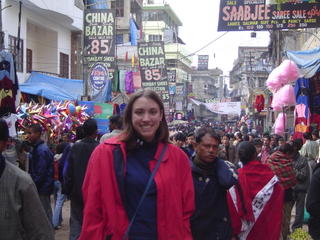 The people I met and lived with for these 4 months are still some of the most special people in my life. I look forward to someday going back to Shillong -- and helping them in any capacity that I can.
The people I met and lived with for these 4 months are still some of the most special people in my life. I look forward to someday going back to Shillong -- and helping them in any capacity that I can.
